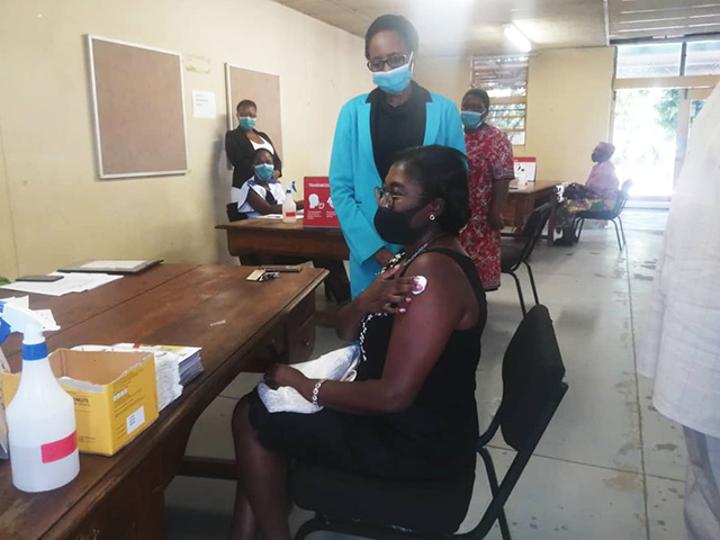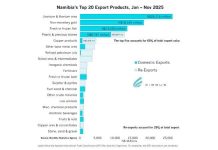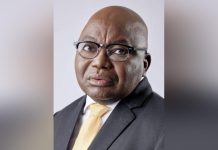Africa-Press – Namibia. HILENI NEMBWAYA, ADAM HARTMAN and LUGERTZIA KOOPERHELENA Nampuala, a resident of Okankolo village in the Oshikoto region, is one of many people in the area who are not aware of a national Covid-19 vaccine campaign currently under way in Namibia.
“What vaccine are you talking about?” she answers when asked whether she has been vaccinated against the novel coronavirus.“We mostly rely on such information from our community leaders, but so far we have not heard anything . . . “I have been to the clinic a number of times this year as well, but the nurses have not informed me of this. It is really good news that there is a vaccine against Covid-19,” she says.Namibia launched its Covid-19 vaccination roll-out in March this year after receiving a batch of Sinopharm vaccine doses from China.However, a lack of awareness and information is affecting the drive.Paulus Mathias says the vaccine roll-out has not reached his community, and many members believe the virus is not preventable.“We do not have access to radios or television here [. . .] and newspapers do not reach us either [. . .] we also cannot read or write, these are some of our challenges,” he says. Mathias says they depend on their local councillors and other community leaders for critical information. ROAD SHOWSOshikoto health director Joshua Nghipangelwa says the health directorate’s office in the region has conducted a number of road shows at towns such as Tsumeb, Omuthiya and Oniipa shortly after vaccines were rolled out in the region.So far, more than 800 people in the Oshikoto region, mostly healthcare workers, have been vaccinated against Covid-19.“The vaccines have been rolled out to all the healthcare facilities in the region, and we have conducted a number of community outreach programmes […] We are planning to reach out to our traditional leaders and constituency councillors to educate and sensitise them on the importance of the vaccines, so that they can pass the message on to their communities,” he says. Nghipangelwa says the region is aiming to vaccinate more than 2 000 people at this stage, although many inhabitants are confused and sceptical due to misinformation about the vaccines.“This vaccine is very important for people to take, because it boosts the immune system, and it prevents the further spread of the virus [. . .] it does not cause any harm,” he says. Johanna Haimene, the health director in the Oshana region, says they have tried to educate communities on the importance of getting vaccinated, but could not reach everyone due to the vastness of the region.ZAMBEZI SHYING AWAY FROM VACCINATIONThe Zambezi regional health directorate has revealed that residents are not showing much interest in getting vaccinated against Covid-19, as they have only vaccinated about 385 people since they started on 19 April.The region has reported 766 Covid-19 cases, including 11 babies, and has recorded more than 700 recoveries.Regional director Agnes Mwilima told The Namibian that the turnout is very low in the region, perhaps because of disinformation about vaccines circulating on social media.The region has received 4 000 doses of the AstraZeneca and Sinopharm vaccines.“We are engaging stakeholders like Development Aid from People to People (DAPP), who have field workers, to sensitise communities in the periphery to get vaccinated against Covid-19. Our own community health workers are being trained to help us raise awareness about getting vaccinated. We hope it will work and people will be more open about being vaccinated,” she said.A resident Blessing Baanda, who spoke to The Namibian, said he has been vaccinated although the vaccines have side effects and there is no guarantee that it will protect him from getting Covid-19 in the future.He added: “If I am travelling out of the country, I am still required to get tested even though I am vaccinated. I am still not free to travel internationally.”The Namibian also spoke to Martin Nchindo, who said he has not decided whether to get vaccinated.“I am still indecisive. For now, I will just keep on wearing my mask, sanitise and observe social distancing to protect myself,” he said.The turn-up in the Kavango East and Kavango West regions is also slow, according to the regions’ health director Timia Ngwira, as only 4 334 people have been vaccinated in both regions since their vaccination campaign started on 20 April.The two regions received 12 000 doses of the Covid-19 vaccines.CONSPIRACY THEORIES ARE LINGERINGPetra Hoaes of Otjimbingwe says she missed out on getting vaccinated when health officials visited the settlement last Friday.She is, however, sceptical of getting vaccinated, she says.“I first want to see what happens to those who took it,” Hoaes says.According to her, the local clinic was packed and many people had to be turned away, because they ran out of vaccinations.Eerike Tomo of Omatjete is still waiting to be inoculated.He says healthcare services have not visited the Erongo settlement yet.“I will definitely take it, because I understand it will keep me from getting sick,” he says.Tomo says there are conspiracies “here and there” about Covid-19 vaccines, but most people at the village have heard that world leaders have taken it, and will therefore follow suit.Annatjie Jordaan says people at Uis have heard of the availability of vaccines in Namibia, but are still waiting for it to be rolled out in their area.“I am careful to take any vaccine. It was developed very quickly, and I am still uncertain about its effectiveness. People are always weary of the unknown,” she says.She calls conspiracy theories “rubbish”.“There’s a lot of that nonsense out there, which can cause confusion. I think for people who have not been sick, it will be a little hard to just trust. People who have been sick though may be eager to take it,” Jordaan says.Linda Bron of Okombahe in the Dâures constituency says she is a frontline worker, and although she has given her name up as a candidate to be vaccinated, she and her colleagues are still waiting.“I will have to think about it carefully though before I rush into a decision to take the vaccine. I think I first want to see how it works out for others,” she says.Bron says she had Covid-19 at the beginning of 2021 and was hospitalised, so she therefore wonders if she may be immune to the virus.RAISING AWARENESSMinistry of Health and Social Services executive director Ben Nangombe says it is the responsibility of everyone in the country to spread awareness of the availability of Covid-19 vaccines.The ministry has so far created about 338 fixed and mobile vaccination points, he says.Nangombe says the ministry is currently faced with the challenge of limited resources and a shortage of vehicles to be used for community outreach programmes.“[I]f we all get vaccinated, we will be protected, and the government will be able to revive the economy, we will be able to open our schools, we will be able to move around without fear, we will be able to open our borders as well [. . .] The vaccine will not cause any harm at all,” he says.






